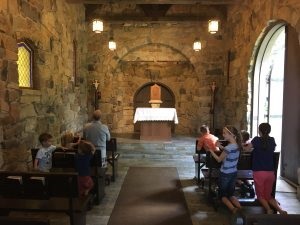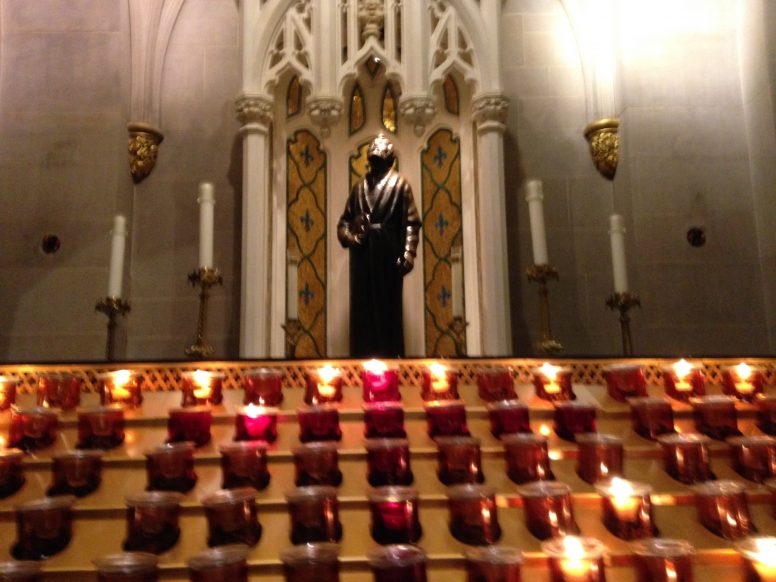- Home
- Daily Meditation
Come to God
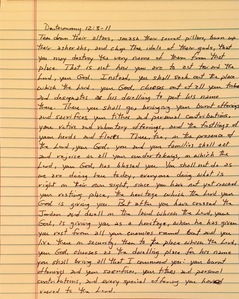
Deuteronomy 12:3-11
Synopsis Deuteronomy 12:3-11 2/13/2018
Moses commanded the children of Israel to destroy the idols and other symbols of worship from the land as they entered. These symbols, which were distributed throughout the land, were to be utterly destroyed.
He directed the people to worship God only in the place where the tabernacle resided. This place, he promised, the Lord would show them as they entered the land.
One Community, One place, One Priesthood, One Faith
With God, individual relationship isn’t the same as communal relationship. From the beginning the scriptures make it clear that individuals can have relationship with the one, true, God – even apart from the promise or the covenant of Abraham.
Enoch had relationship with God. Melchizedek had relationship with God. Job had relationship with God. Even Balaam had relationship with God.
As individuals, God might meet us anywhere. He met Abraham in Haran. He met Moses on Mount Zion. He met Balaam in Ammon. Jesus met the woman at the well – where she was drawing water. God is willing to come to the individual.
We Come to God
For the community, it’s different. In Community, we come to God.
It was always His way. God created for community. Community is the achievement. He is the cause and substance of authentic community. The community has identity and persistence and purpose and meaning only in God. When we fall away, disassociate, but then repent, he welcomes us back.
This is God’s project. The Community. The Authentic Community.
“Draw near to God, and he will draw near to you.” James 4:8
Blessing and Curse
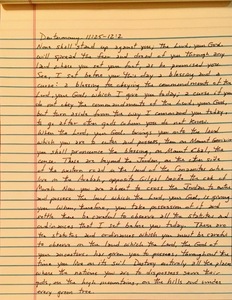
Deuteronomy 11:25-12:2
Synopsis Deuteronomy 11:25-12:2 2/12/2018
Moses reminded the people that no nation would be able to resist them with God on their side. He worked to help the people understand that they should have no fear of the nations around them.
But, he pointed out, the covenant with God that they had entered into was like a two edged sword. It contained within it both a blessing and a curse. And so, Moses set out these two starkly different outcomes. The blessing of obedience and perfect freedom in the land. The curse of disobedience, which would result in the loss of freedom, fear, and eventually their own ejection from the land.
And the one great, persistent temptation, was the worship of false gods.
Other gods, Whom You Do Not Know
Other gods are not gods. They are the misplaced result of human effort and creativity. They are somewhat coherent, beautiful, mythical fantasies.
Examples to illustrate: “The crops failed because the gods of the soil were displeased” or “my child died because I failed to appease the gods of the land.” False narratives give a plausible, causal explanation for the experiences of life.
In a way, these over-the-top claims can be seen as a reach for the transcendent – an effort to make sense out of life. But false narratives suffer this common characteristic: they become ever more convoluted. As they do, they become less plausible, until they are suddenly, obviously ridiculous, especially to the outside observer.
The One True God
God is one. There is none other. God is love; Utterly, simply, love. The outpouring of His love has brought forth creation. And out of creation come you and I – infinitesimally small yet entirely significant reflections of His goodness and freedom. A coherent narrative that matches experience and manifests the meaning of life.
And within us is built this covenant. It was never something externally imposed. The covenant of God is built into the very fabric of all being. And we, like the children of Israel before us, choose each day, either the increasingly convoluted nonsense that always emerges when we fail to trust God, or a life filled with purpose, and hope and love.
“The Father and I are one” John 30
Teach and Remember
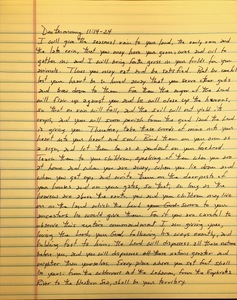
Deuteronomy 11:14-24
Synopsis Deuteronomy 11:14-24 2/11/2018
Moses instructed the Israelites to not take their knowledge of God’s precepts for granted. He instructed that they should keep them front and center of their thoughts. He encouraged them to use reminders to help them. Appropriate reminders included phylacteries, and writings on the fence gates and doorposts of their homes. He also tasked them to teach the law of the Lord to the coming generations.
Teach and Remember
The idea was that regular discourse about the law of the Lord would become so habitually integrated in the daily routine that both God and His precepts could not be forgotten. Teaching and remembering would become the same.
The habit of thinking about God.
The habit of worshipping God.
“Keep my commands and live, and my teaching as the apple of your eye; Bind them on your fingers, write them on the tablet of your heart.” Prov 7:2-3
Water is Life

Deuteronomy 11:3-13
Synopsis Deuteronomy 11:3-13 2/10/2018
Moses encouraged the children of Israel to recognize the acts that God had done to get them through the wilderness and to the promised land. He mentioned the provisions that were made but also the separation that had taken place between those who loved God and desired to serve Him, and those who didn’t.
He reminded the Israelites of the promises of God and helped to focus the hearts and minds once again on the blessings of land. He recounted the virtues of the land, especially in the blessings of abundant water.
Water is Life
Water is life. And the way water comes to us affects the way we understand how life works.
God told the people through Moses that in the Promised Land, water was abundant in the mountains and valleys. In Egypt, the water came from the river. Life was built around the seasonality of river. The flooding, the dry times; Egyptian culture and life was built on this rhythm.
But in the land of promise, the goodness was ever present, caught in the valleys and flowing from the mountains. It did not need to be carried by hand in small containers. Instead, water was abundant and integral to the land.
An Ever-present, Integrated Life
It’s funny how literal the analogy is.
I can live in Egypt. Sometimes I choose that. To come to the word, or the sacraments only occasionally. To drag myself through the doors of a church building where I perceive little or no value. A habit from my childhood that I resent just a little less than I fear stopping.
Or I can drink daily. I can consciously enter the narrative of God’s story – seeing my life in the context of the story of His life. Or even more fully by transcending every narrative and communing with the God of all creation in prayer, in liturgy, in sacrament.
“but whoever drinks the water I shall give will never thirst; the water I shall give will become in him a spring of water welling up to eternal life.” John 4:14
Imitate the Action
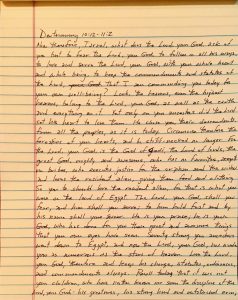
Deuteronomy 10:12-11:2
Synopsis Deuteronomy 10:12-11:2 2/9/2018
Moses continued in his message to the Israelites. He challenged them to recognize God’s power and dominion. He reminded them that they were chosen because of God’s love for their ancestors. Out of all creation, they were chosen. God esteemed them as somehow special.
Finally he admonished them to imitate the creative behavior of God. Recognize, he encouraged, that God loves the orphan, widow and resident alien. And for this reason – to be in harmony with Him – they should too.
Harmony from Imitation
Imitation is natural communication. If you’re trying to teach a group of people to hula-hoop, your best bet isn’t a physics lecture. It’s a demonstration.
That doesn’t mean a physics lecture wouldn’t explain what’s going on. But it’s also not likely to get a room full of people to move.
Imitate God, Imitate Christ
Paul once said, “Be imitators of me, as I am of Christ” 1 Cor 11:1 It wasn’t that he was trying to cultivate a personal following. He was saying, “I found something meaningful here and the way to experience it is to do what I’m doing”.
Swing your Hips!
That’s what my daughters tell me. It isn’t pretty, but even I can get a hula hoop going if I imitate their motion.
We find the spirit of God when we begin to imitate the things that God does. Do the same things you see God doing – It’s like a secret passage into a deeper reality. The doing brings the understanding. Not doing eliminates the possibility of understanding. Action, and action alone, is capable of harmony.
So let’s get moving!
“Jesus answered and said to them, “Amen, amen, I say to you, a son cannot do anything on his own, but only what he sees his father doing; for what he does, his son will do also.” John 5:19
Stone and Flesh
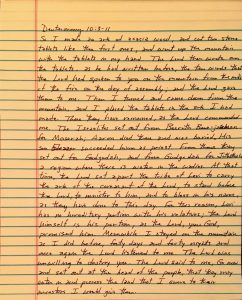
Deuteronomy 10:3-11
Synopsis Deuteronomy 10:3-11 2/8/2018
The Lord wrote for a second time on stone tablets. Moses remembered how he had put these in the ark. He mentioned also, how the Levites had been separated to serve in the tabernacle ministry before the Lord.
God Wrote
“God wrote” – not “Moses wrote what God told him”.
God uses the written word.
Of course, He does. The scripture is the inerrant word of God. But this is the only time that God wrote words on tablets of stone.
The Paradox of Living Word in Stone
God is immutable and yet He is utter dynamism. Never changing and yet He is the source of an ever-changing world. Essence and form and birth and death.
It’s a little odd: This mysterious God.
The immovable and never changing word. The Word made flesh. The Word that challenges everything we thought we knew and yet doesn’t change. It challenges my heart to enter into the possibility of my life while sitting silently, somewhere, in an ark of acacia.
“Indeed, the word of God is living and effective, sharper than any two-edged sword, penetrating even between soul and spirit, joints and marrow, and able to discern reflections and thoughts of the heart” Heb 4:12
Power of Prayer
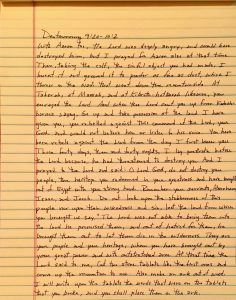
Deuteronomy 9:20-10:2
Synopsis Deuteronomy 9:20-10:2 2/7/2018
Moses remembered how God was angry with the children of Israel – and even with Aaron. He recounted the many other times in the wilderness when the Israelites had provoked the Lord to anger. And he reminded the Israelites how he had remained in prayer for forty days and forty nights in order to save them from God’s wrath. After this, God inscribed a second set of stone tablets. He instructed Moses to make an ark out of wood to carry the new tablets.
The Righteous Intercessor
The power of intercessory prayer.
It is written, “The fervent prayer of a righteous person is very powerful.” James 5:16
Moses’ prayer saved an entire people from destruction. Fasting and prayer. Prostrate before the Lord. 40 days and 40 nights.
Prayer. The admonishment to pray isn’t a burden to lay on another. Not a judgement on the spiritual health of a brother or sister. Not a guilt trip you use to get yourself to do something you don’t really want to do.
It’s a possibility. It’s a manifestation. It’s a picture of love. Moses, on the ground, on his face, pleading and beseeching. Not for his own sake.
Fast and Pray
It’s easy to read the words: Fast and pray for forty days and forty nights.
To really intercede is work. It’s real and sometimes it’s hard. But like all hard work, it brings a profit.
“Pray without ceasing.” 1 Thessalonians 5:17
Mercy and God
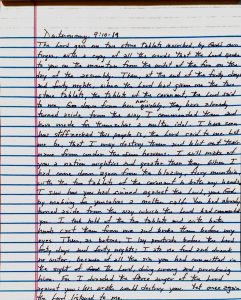
Deuteronomy 9:10-19
Synopsis Deuteronomy 9:10-19 2/6/2018
Moses remembered how God had inscribed the Ten Commandments. He wrote them with His own finger. He entrusted them to Moses after Moses had fasted 40 days and forty nights. During that time, Moses ate no food and drank no water.
While he was on the mountain, the people had made an idol. It was molten figure from gold. This offended God and He pondered destroying the children of Israel. Moses begged for mercy from God for the sin of the people. God gave them mercy.
God’s Mercy
God didn’t destroy. He contemplated their destruction. The children of Israel were only days and weeks into their “eternal” covenant with the God of all creation. And they had failed. Idolatry – they had failed in the worst way.
Moses intervened. He threw himself into the breach. He begged for their lives to be spared. He argued the good of mercy for their sake and for God’s reputation. God relented. God didn’t destroy.
This is God’s mercy.
Be Merciful
How to make sense of mercy.
A covenant that has been breached is broken. It can’t be healed without mercy. The offended party has to defer their legitimate right to sever the relationship, to punish, or else it is over.
It is written: The LORD’s acts of mercy are not exhausted, his compassion is not spent; They are renewed each morning – great is your faithfulness!” Lament 3:22-23
I didn’t just offend the covenant once. Mercy is also the commitment a person makes to consistently meet the injustice of a partner. It is not deserved and cannot be demanded. The power is always in the hand of victim.
And so, if you want to understand mercy; then be merciful.
“Be merciful, just as [also] your Father is merciful. Stop judging and you will not be judged. Stop condemning and you will not be condemned. Forgive and you will be forgiven.” Luke 6:36
Circumstances and Relationship
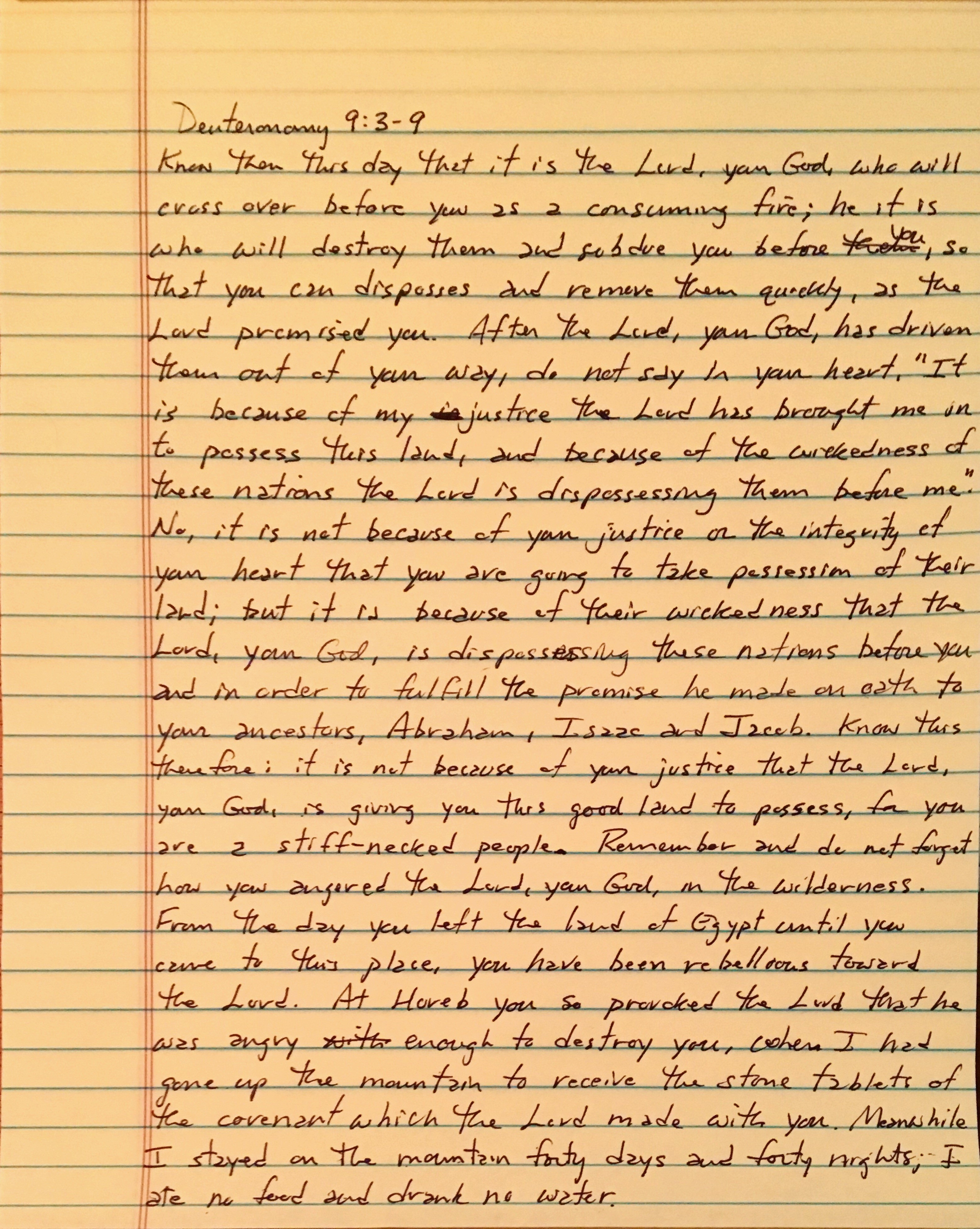
Deuteronomy 9:3-9
Synopsis Deuteronomy 9:3-9 2/5/2018
Moses prophesied to the people. He told them that God would do the work of driving out the inhabitants of the land. He reminded them that God wasn’t doing these things because the Israelites were righteous. Instead, God was driving out the people because of the wickedness of the Canaanites and because of the promise to Abraham.
Judge Circumstances Wisely
The tendency is to believe that a person blessed is blessed because of his or her righteousness. Alternatively, a person suffering is suffering because of some moral failure; some hidden sin in their life.
Moses pointed out to the Israelites that they weren’t given the promised land because of their righteousness. They hadn’t “earned” this blessing. So if we look at the Promised Land as this extraordinary gift given to the Israelites and conclude that they were especially righteous – we would err.
Why then, were they given the land?
The short answer came from God. First, the Canaanite’s Nazi-like wickedness cried out for redress. This combined with the promises God made to Abraham, Isaac and Jacob. Nothing to do with the righteousness of the Israelites.
Reason for “Good” Gifts
But the long answer has to do with relationship. We know we can’t judge a person’s righteousness based on their circumstances – I can’t judge my own righteousness based on my circumstances.
What then, makes a set of circumstances good?
Here’s a claim: Life’s highest possibility is to know God as a person – to know the person of God – to be a friend of God.
So my circumstances, whether filled with pleasure or suffering, or a little of both, are orchestrated to bring me to the place of relationship. The love I’ve received, even the evil I’ve suffered, these will lead me to the place of relationship if I’m willing to follow.
Jesus answered, “Neither he nor his parents sinned; it is so that the works of God might be made visible through him.” John 9:3
The Desperate Seek God
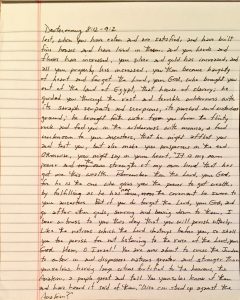
Deuteronomy 8:12-9:2
Synopsis Deuteronomy 8:12-9:2 2/4/2018
Moses spoke of the danger of forgetting God. He reminded the Israelites of God’s ability to lead the entire nation through the most inhospitable wilderness. Moses begged them not to forget God as they prospered in the new land because, forgetting God would lead to their ultimate doom.
The Desperate Seek God
Desperate people seek God. The terminal diagnosis; the financial disaster; the horrific auto accident; the miscarry of a childless mother; the hopelessly depressed; these are the moments of desperation.
When I have exhausted every other option, I seek God. I seek Him wholly and earnestly. Even if I am reluctant to embrace Him, I know I have nothing to lose – because I have already lost everything I thought I wanted. I come to God destitute.
Let’s face it, if I could have found deep satisfaction on my own, without God, I would have done so.
The Distraction of Wealth
There was a time in my life when it didn’t seem like I could lose. Nothing was outside my grasp: Wealth, position, power, honors, relationships – all of it came to me easily.
And these satisfied and distracted. Busyness, adventure, choice wine, exotic food, important work; they filled the minutes and hours and days so full I couldn’t imagine doing more, or having more.
Except somehow, I did want more. Nothing I did lasted. Every activity ended too soon. Every mountain top adventure made me realize there was a yet taller mountain to climb. Every tasty dish never tasted quite the same the second time. Every bottle of wine made me regret a lost memory and a head of pain.
We all envy the wealthy man. I always envied the wealthy man.
Cultivating the Awareness of Need
But when a wealthy man sits still, really still, he is filled with a sadness. It is a strange sadness that is so intense and so painful, he will do anything to escape it. So he quickly starts moving again.
He does not know that this stillness is a true calling. He does not realize that all of his hopes and dreams and ambitions are actually on the other side of that painfully, intense sadness. And so he runs away.
But the hope for him, and for me, is in embracing the pain. Allowing my false self to feel death; to die. No one will stand for this except they believe that a resurrected life might hide somewhere on the other side.
It’s only then that I will allow myself to be quiet – really quiet. Silent. And it’s only in that silence that God can really begin to be heard.
“let us crown ourselves with rosebuds before they wither” Wisdom 2:8






